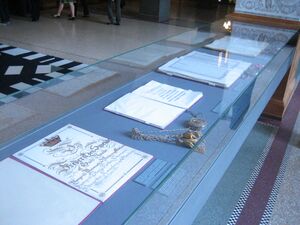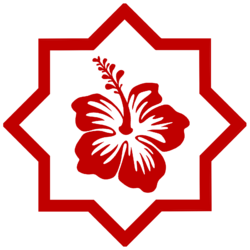Constitution of the Glanish Commonwealth: Difference between revisions
Jump to navigation
Jump to search
(Created page with "{{Infobox document |document_name = Constitution of the Glanish Commonwealth |image = Danish Constitions in Folketinget 20090520.jpg |image_width = 250px |image_capt...") |
No edit summary |
||
| (One intermediate revision by the same user not shown) | |||
| Line 12: | Line 12: | ||
}} | }} | ||
The Constitution of the [[Glanish Commonwealth]] (Glanish: ''Grundlov''), sometimes referred to as the Second Glanish Constitution, is the supreme law of Glanodel. It is the second and current {{wp|constitution}} of Glanodel and establishes the Commonwealth as a {{wp|federal republic}} composed of 13 cantons ({{wp|federated state}}. Following the end of the [[Great War (Aeia)|Great War]] in 1899, a Constitutional Conference was held among the leaders of the Glanish Resistance Movement, which had served as the nation's ''{{wp|de facto}}'' provisional government. Drafting of the document began on 1 February 1900 and after seven revisions, the final draft was ratified on 5 March 1900. | <!--The Constitution of the [[Glanish Commonwealth]] (Glanish: ''Grundlov''), sometimes referred to as the Second Glanish Constitution, is the supreme law of Glanodel. It is the second and current {{wp|constitution}} of Glanodel and establishes the Commonwealth as a {{wp|federal republic}} composed of 13 cantons ({{wp|federated state}}. Following the end of the [[Great War (Aeia)|Great War]] in 1899, a Constitutional Conference was held among the leaders of the Glanish Resistance Movement, which had served as the nation's ''{{wp|de facto}}'' provisional government. Drafting of the document began on 1 February 1900 and after seven revisions, the final draft was ratified on 5 March 1900. | ||
The document is composed of a {{wp|preamble}}, which establishes the reasons for founding the Commonwealth and priorities of the new government, its six original articles. Its first three articles entrench the doctrine of {{wp|separation of powers}}, dividing the federal government into three branches (legislative, executive, and judicial). Article Four, often referred to as the ''Bill of Rights'', defines Glanish {{wp|citizenship}} and federally protected {{wp|individual and group rights|individual and popular rights}}, and establishes the federal institution of {{wp|referendum|popular referenda}}. Articles Five and Six entrench concepts of {{wp|federalism}}, describing the rights and responsibilities of cantonal governments and of the cantons in relationship to the federal government. | The document is composed of a {{wp|preamble}}, which establishes the reasons for founding the Commonwealth and priorities of the new government, its six original articles. Its first three articles entrench the doctrine of {{wp|separation of powers}}, dividing the federal government into three branches (legislative, executive, and judicial). Article Four, often referred to as the ''Bill of Rights'', defines Glanish {{wp|citizenship}} and federally protected {{wp|individual and group rights|individual and popular rights}}, and establishes the federal institution of {{wp|referendum|popular referenda}}. Articles Five and Six entrench concepts of {{wp|federalism}}, describing the rights and responsibilities of cantonal governments and of the cantons in relationship to the federal government. | ||
| Line 21: | Line 21: | ||
''Main article: [[History of Glanodel]]'' | ''Main article: [[History of Glanodel]]'' | ||
==Preamble== | ==Preamble== | ||
| Line 34: | Line 32: | ||
===Article I: Legislative Branch=== | ===Article I: Legislative Branch=== | ||
Article One establishes the federal legislative branch of the Commonwealth, the [[ | Article One establishes the federal legislative branch of the Commonwealth, the [[Congress of the Commonwealth]] (Glanish: ''Congress of the Commonwealth''), states it is the successor to the previous legislature Landsmeet, defines its two chambers, and the positions of the Chancellor of the Upper House and Speaker of the Lower House. | ||
Section One grants the | Section One grants the Congress sole, federal legislative power. Section Two establishes the powers of the Congress such as the authority to tax, borrow, pay the nation's debt, raise and maintain a standing army and navy, and create programs, agencies, or organizations to provide for the general welfare of the population. | ||
Section Three describes the {{wp|upper house}}, the Højerhuset | Section Three describes the {{wp|upper house}}, the Højerhuset, defines its exclusive powers (such as approval of Supreme Court justices), and establishes the role of the Chancellor of the Upper House. Section Four describes the {{wp|lower house}}, the Underhuset, defines its exclusive powers (such as {{wp|impeachment}} of federal executive officers), and establishes the role of the Speaker of the Lower House. | ||
Section Five defines those who are eligible to serve as a member of the federal legislature within both houses. It describes the election procedures for both houses and defines the nation's {{wp|party-list proportional representation}} election system. It also defines how long and how many times a representative can serve, and how they can be removed from office, as well as the procedures in the event of resignations or deaths while in office. | Section Five defines those who are eligible to serve as a member of the federal legislature within both houses. It describes the election procedures for both houses and defines the nation's {{wp|party-list proportional representation}} election system. It also defines how long and how many times a representative can serve, and how they can be removed from office, as well as the procedures in the event of resignations or deaths while in office. | ||
| Line 46: | Line 44: | ||
===Article II: Executive Branch=== | ===Article II: Executive Branch=== | ||
Article Two establishes the executive branch of the federal government, its purpose and powers, its exclusive authority (actions which can be taken without the authority of the | Article Two establishes the executive branch of the federal government, its purpose and powers, its exclusive authority (actions which can be taken without the authority of the Congress), as well as the Office of the President, their cabinet, and the President's authority in foreign affairs. | ||
Section One establishes the President of the Commonwealth as the ''"{{wp|head of state}} and {{wp|head of government|government}}"'' and the nation's highest ranking public official. It also tasks the President with ''"leading the executive branch of government in the execution of the nation's federal laws, as well as other duty tasked to the President by the lagislature"''. | Section One establishes the President of the Commonwealth as the ''"{{wp|head of state}} and {{wp|head of government|government}}"'' and the nation's highest ranking public official. It also tasks the President with ''"leading the executive branch of government in the execution of the nation's federal laws, as well as other duty tasked to the President by the lagislature"''. | ||
| Line 135: | Line 133: | ||
{{quote|''"A person is irrefutably entitled to donate their time and money in support of, or against, a candidate they chose. However, political influence should be reliant solely upon the status of a person's citizenship. Not a person's financial success, nor the virtues or status granted to them by birth should grant with that status any more or any less of a voice within our political process. Furthermore, the guaranteed right to contribute personal resources in favor of or against chosen candidates is a right reserved only by citizens and organizations founded by citizens for the express purpose of political action. A private enterprise is, by definition, not a single citizen, nor an organization founded for the purposes of political action. Thus, these entities do not reserve the right to donate in favor of, or against, a chosen candidate."''}} | {{quote|''"A person is irrefutably entitled to donate their time and money in support of, or against, a candidate they chose. However, political influence should be reliant solely upon the status of a person's citizenship. Not a person's financial success, nor the virtues or status granted to them by birth should grant with that status any more or any less of a voice within our political process. Furthermore, the guaranteed right to contribute personal resources in favor of or against chosen candidates is a right reserved only by citizens and organizations founded by citizens for the express purpose of political action. A private enterprise is, by definition, not a single citizen, nor an organization founded for the purposes of political action. Thus, these entities do not reserve the right to donate in favor of, or against, a chosen candidate."''}} | ||
Since this ruling, the federal government of Glanodel, along with several cantonal governments, have passed laws which mandate strict accountability and reporting requirements for all private organizations involved in political action. | Since this ruling, the federal government of Glanodel, along with several cantonal governments, have passed laws which mandate strict accountability and reporting requirements for all private organizations involved in political action.--> | ||
{{Template:Glanodel}} | {{Template:Glanodel}} | ||
Latest revision as of 21:35, 16 October 2022
| Constitution of the Glanish Commonwealth | |
|---|---|
 A photograph of the Constitution in its display case. | |
| Created | 21 February 1900 |
| Ratified | 5 March 1900 |
| Location | Presidential Library, Vænholm |
| Author(s) | Sebastian Thuesen, Otto Knudsen, Ivar Lange |
| Signatories | Alex Åberg (first President of Glanodel) |
| Purpose | Formation of the Commonwealth and Supreme Law of Glanodel |
